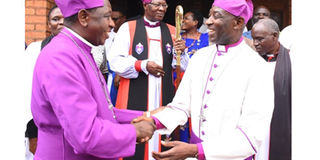Prime
Has Church of Uganda lost voice?

Church of Uganda bishops at a past event. PHOTO/FILE
What you need to know:
- Drawing from the example of Archbishop Janani Luwum, Bishop Senyonjo pens: “...the church, as the embodiment of the love of Jesus, needs to speak out actively against political and economic excesses, even at highest of costs.”
Perhaps we learn more than usual that the Church’s voice is absolutely critical, especially during difficult times akin to what we experience in Uganda today. Yet, for her voice to command both the respect and authority, the Church leadership should neither be annoyingly ‘shy’ nor slow to speak out against excesses in society. And when they do, it should be with such a quality that we would not be tempted to query their sense of unity.
Under Canon 1:16 of the 1997 Provincial Canons, the Church of the Province of Uganda (CoU), perhaps quoting Martin Luther King, Jr., “...conceives itself as the conscience of society [read: State].”
The lopside of things in CoU, however, is such that we have mostly preferred to remain mute on occasions when our prophetic voice should have been clearly heard; or to intentionally withhold our support for those among us who have, rather courageously, spoken up; or to deliberately speak in hushed tones; or at best, to issue statements under the cover of the Inter-Religious Council of Uganda (IRCU), as well as that of the Uganda Joint Christian Council (UJCC).
It is only recently that one senior clergyman decried the CoU’s approach, for instance, to President Museveni’s attempt at life rule, thus: “[A]las! We are so divided in our perspectives of his presidency. Is it any wonder that we get such arrogant response[s] [from him]? May God help us...”
“Playing it safe and seeking favours,” he cautions “will lead to a disastrous end of the Church and our beloved country, Uganda. Silence means we are in league with the perpetrators of evil.”
One finds it absolutely unnecessary to rehearse the argument that locates one’s Christian duty to take keen interest in the affairs of one’s Church; to offer oneself for service therein; to defend her when she is under attack; to both advise and be critical of her leadership, especially when things go awry, albeit with the mind that while the degree might differ, we all ultimately court success and failure.
The Rt Rev Dr Christopher Senyonjo, a former Bishop of West Buganda (1974-1998), has in his 2016 autobiography, ‘In Defense of All God’s Children,’ not only shared insights about his life and ministry, but also representatively challenged, thus:
“Church leaders are human beings who are largely conditioned and influenced by the politics, biases, and human condition of the environment in which they reside. Therefore, it is incumbent upon Christians to be active participants in Church affairs so that they can call the Church to account when it falls short in its mission as a bearer of Christ’s Good News to the afflicted, the oppressed, and the marginalised.”
Drawing from the example of Archbishop Janani Luwum, Bishop Senyonjo further pens: “...the church, as the embodiment of the love of Jesus, needs to speak out actively against political and economic excesses, even at highest of costs.”
“Unfortunately,” he regrets, “with a few exceptions, the response of the Church of Uganda to injustice and tyranny has often mirrored the dominant attitudes and biases within the population.” He illustrates his point using the 1970s and 1980s experience.
As some sort of study, one often tries to work out more precisely what bars the CoU leadership, in contrast, for instance, to her Roman-Catholic counterparts, to do as well as we could have hoped in issuing a joint charge/pastoral letter on the country’s status quo as and when the need arises; and to exercise our comparative advantage over them by drawing inspiration from our historic Protestant heritage to push for a better state of affairs.
Conversely, why are we very much engrossed in remonstrations on salvation and (homo)sexuality? One is rather worryingly persuaded that we are running the risk of presenting the former as an only spiritual affair and the latter as the gravest sin, whereas not.
CoU ought to re-orient herself on the significance of political/public theology- in balance with her evangelical theology - for salvation is multifaceted and not only ‘spiritual’ as we have been made to believe for donkey’s years.
“May the Church in Uganda,” a senior clergyman and theologian has prayed “rise up to the power it has been given.”
Jonathan Mwesigwa S,
[email protected]




